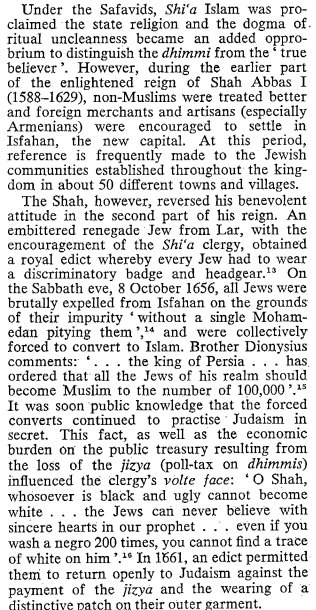This chapter seems to have been written in 1666 itself, and it has a story I cannot find anywhere else.
According to the book, during the reign of Shah Abbas I, a prince of Persia had the idea to open up trade between Persia and neighboring countries, by making it easier for traders to travel and make agreements. Naturally, the Jews from within and without Persia took advantage of this loosening of restrictions and prospered. This made their competitors jealous so they complained to the Shah.
Abbas had to come up with a way to keep the benefits of the trade while stopping the Jews from profiting. So he came up with a plan and summoned the Jewish religious leaders.
The Sophy (I think he is a prince and grandson who succeeded Abas I) asked them what they thought of Jesus. Frightened, they answered that they did not believe in him and expected their own messiah to come to deliver them from their oppressors.
He then became angry, saying that even the Koran writes favorably about Jesus, and calling them names. He then asked what they thought about Mohammed. This question scared them even more, and after conferring they said that since Mohammed was an Ishmaelite they do not consider him a false prophet, although they do not believe in him.
The Sophy then asked them to come up with a date by which the Jewish messiah would arrive. If he did not appear, they would be subject to death or conversion; if he did, then the Emperor would convert to Judaism.
Thinking it over, they gave a date seventy years in the future, calculating that in that time period al lof them would be dead and by then the Jews would come up with a plan to either pay off the Emperor or th eedict would be forgotten. The emperor accepted the term, and even added five years to it.
Decades later, the great-grandson of this Emperor - Abas II - came upon the old edict. At that same time there were rumors about a Jewish messiah who had appeared (the false messiah Shabbatai Tzvi) and this frightened the later emperor into deciding to destroy the Jews of Persia.
A proclamation was written, sounding much like the story of Esther, where any citizen was allowed to kill every Jewish man, women and child unless they converted to Shia Islam. The edict was first put in place in Isfahan and later in all of Persia, between 1663 and 1666.
According to this book, the Persians accepted the edict with relish, and they attacked the Jews who did not convert or manage to escape Persia (many to India, Turkey and elsewhere.)
This ends the story in the book.
According to other sources, however, things happened a little differently, with a different chronology. From The Jews Under Muslim Rule: The Case of Persia, by David Littman, 1979:
I don't know which account is more accurate.

 Elder of Ziyon
Elder of Ziyon
















.jpg)





